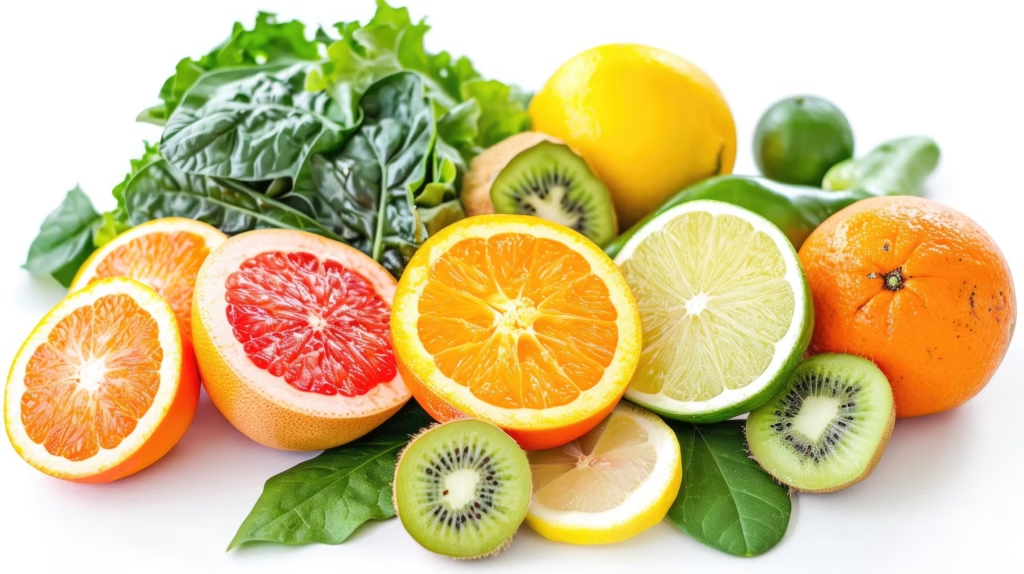A regular menstrual cycle is a vital indicator of a woman’s overall health, yet many women experience irregularities due to hormonal imbalances, stress, or nutritional deficiencies. While lifestyle changes and medical interventions can help, incorporating the right vitamins into your diet is a natural and effective way to support menstrual health. Certain vitamins play a key role in regulating hormones, reducing menstrual discomfort, and promoting overall reproductive health. .
In this blog, we’ll explore the best vitamins to regulate your menstrual cycle, how they work, and practical tips for integrating them into your routine for better menstrual health.
Understanding the Menstrual Cycle
The menstrual cycle is a natural, recurring process that prepares the female body for pregnancy, regulated by a complex interplay of hormones such as estrogen, progesterone, follicle-stimulating hormone (FSH), and luteinizing hormone (LH). While the typical cycle lasts around 28 days, variations between 21 to 35 days are also considered normal.
It is divided into four key phases: the menstrual phase, where the uterine lining sheds; the follicular phase, marked by the development of ovarian follicles and the regeneration of the uterine lining; ovulation, when a mature egg is released, signaling the most fertile period; and the luteal phase, during which the uterine lining is maintained in preparation for a potential pregnancy. If pregnancy does not occur, the cycle begins anew.

Irregular menstrual cycles can arise from several factors. Hormonal imbalances, such as those caused by polycystic ovary syndrome (PCOS), thyroid disorders, or menopause, are common culprits. Stress, drastic weight changes, excessive physical activity, or significant lifestyle changes can also disrupt the hormonal balance. Additionally, medical conditions like uterine fibroids, endometriosis, or chronic illnesses, as well as certain medications, including hormonal contraceptives or treatments like Ozempic, may influence cycle regularity. Pregnancy, breastfeeding, and age-related changes, such as during puberty, further contribute to variations in menstrual patterns.
Recommended: Does Semaglutide Affect Menstrual Health?
Why Vitamins Are Important for Hormonal Balance
Vitamins are essential for maintaining hormonal balance and supporting reproductive health. They regulate hormone production, enhance communication between glands, and ensure the reproductive system functions optimally. Key vitamins such as B-complex vitamins, vitamin D, vitamin E, and vitamin C play significant roles in promoting a healthy menstrual cycle.
B-complex vitamins, particularly B6 and B12, help balance estrogen and progesterone levels, which are crucial for regular cycles and ovulation. Vitamin D influences ovarian function and supports consistent menstrual cycles, while vitamin E reduces inflammation and aids in the repair of reproductive tissues. Vitamin C supports adrenal health and improves iron absorption, contributing to hormonal stability and menstrual wellness.
Deficiencies in these vitamins can disrupt hormonal balance, leading to menstrual issues such as irregular cycles, heavy bleeding, or anovulation. For instance, insufficient vitamin D levels are associated with conditions like PCOS, which can cause irregular periods, while a lack of B vitamins can impair ovulation. Similarly, low vitamin C levels may lead to anemia, further affecting menstrual patterns.
Best Vitamins for Menstrual Cycle and How They Work
Vitamins are essential for regulating the menstrual cycle and supporting hormonal balance. Here’s a breakdown of the key vitamins that promote menstrual health and their functions:
Vitamin B6 (Pyridoxine)
Vitamin B6 plays a significant role in regulating mood and hormonal balance during the menstrual cycle. It alleviates PMS symptoms such as mood swings, irritability, and fatigue by supporting serotonin production, a neurotransmitter that enhances emotional stability. Additionally, it helps balance estrogen and progesterone levels, ensuring a more predictable and stable menstrual cycle. Common sources of vitamin B6 include poultry, fish, bananas, chickpeas, fortified cereals, and potatoes.
Recommended: How to Plan Pregnancy With Irregular Cycles
Vitamin B12
Essential for the production of healthy red blood cells, vitamin B12 prevents anemia caused by excessive blood loss during menstruation. It supports ovulation by maintaining healthy egg development and improves overall energy levels, particularly beneficial during the menstrual phase. Vitamin B12 also works synergistically with folate to aid DNA synthesis and cell repair. Dietary sources include meat, eggs, dairy products, shellfish, and fortified plant-based foods like cereals and nutritional yeast.
Vitamin D
Vitamin D is crucial for reproductive health as it supports ovarian function and the regulation of reproductive hormones, particularly estrogen and progesterone. A deficiency in vitamin D has been linked to irregular menstrual cycles and conditions like PCOS. Vitamin D also plays a role in calcium absorption, which can help reduce muscle cramps, including those associated with menstruation. You can obtain vitamin D from sunlight exposure, fatty fish like salmon and mackerel, fortified dairy products, and mushrooms.
Vitamin E
Known for its strong antioxidant and anti-inflammatory properties, vitamin E reduces the severity of menstrual cramps and breast tenderness, common symptoms of PMS. It also aids in the repair of uterine tissues and supports healthy blood circulation, ensuring a smoother menstrual experience. Vitamin E promotes skin health, which can be beneficial for those experiencing hormonal acne during their cycle. Nuts, seeds, spinach, avocados, and sunflower oil are excellent sources of vitamin E.
Vitamin C
Vitamin C enhances the absorption of iron from plant-based foods, which is essential for replenishing iron lost during menstruation. It also boosts adrenal gland function, helping stabilize hormone levels and reducing stress-induced menstrual irregularities. Additionally, vitamin C supports collagen formation, which aids in maintaining healthy blood vessels and tissues in the reproductive system. Citrus fruits, bell peppers, strawberries, kiwis, and broccoli are rich in vitamin C.

Vitamin K
Vitamin K plays a vital role in blood clotting, helping to manage heavy menstrual bleeding and reduce the risk of excessive blood loss. It also supports bone health and collaborates with vitamin D to regulate calcium levels, which may help ease menstrual-related muscle spasms. This vitamin is abundant in leafy greens like kale and spinach, as well as broccoli, cabbage, and fermented foods like natto.
Recommended: 7 Best Supplements for Postpartum Hair Loss
Folate (Vitamin B9)
Folate is indispensable for DNA synthesis and cell division, making it crucial for healthy ovulation and the formation of the uterine lining. It also aids in managing anemia caused by heavy periods and is essential for women trying to conceive, as it supports fetal development. Folate can be found in leafy greens such as spinach, beans, lentils, asparagus, fortified grains, and citrus fruits.
Omega-3 Fatty Acids (Not a Vitamin but Important)
Although not a vitamin, omega-3 fatty acids are vital for reducing inflammation and menstrual cramps. They help regulate hormones like prostaglandins, which are associated with pain and inflammation during menstruation. Omega-3s also improve overall reproductive health and mood stability. Fatty fish like salmon, mackerel, and sardines, as well as plant-based sources like walnuts, chia seeds, and flaxseeds, are excellent sources.
Benefits of Using Vitamins for the Menstrual Cycle
Incorporating essential vitamins into your diet or supplementation routine offers numerous benefits for maintaining menstrual cycle and overall well-being:
Supports Hormonal Regulation
Vitamins such as B6, D, and E help balance hormones like estrogen and progesterone, which are essential for a regular and healthy menstrual cycle.
Reduces Premenstrual Symptoms (PMS)
Vitamin B6 alleviates mood swings, irritability, and anxiety, while vitamin E helps minimize symptoms like breast tenderness and bloating.
Recommended: Natural Remedies for PMS Mood Swings
Alleviates Menstrual Cramps
Anti-inflammatory vitamins like E and D ease uterine contractions, reducing the severity of cramps and menstrual discomfort.
Prevents Anemia
Vitamins B12, C, and folate support red blood cell production and improve iron absorption, addressing anemia caused by heavy bleeding during periods.
Regulates Cycle Consistency

Vitamin D plays a key role in improving ovarian function, promoting more regular cycles, and reducing irregularities often linked to conditions like PCOS.
Enhances Fertility
Vitamins like folate support ovulation and improve egg quality, increasing the chances of conception for those trying to conceive.
Promotes Energy Levels
By supporting red blood cell formation and reducing fatigue, vitamins like B12 and folate ensure better energy management throughout the menstrual cycle.
Recommended: Does Ozempic Affect Menstrual Cycle?
Improves Overall Reproductive Health
A steady intake of essential vitamins helps maintain uterine and ovarian health, contributing to an efficient and well-functioning reproductive system.
Conclusion
Maintaining a healthy menstrual cycle is crucial for overall well-being, and vitamins play an essential role in supporting this process. By regulating hormonal balance, alleviating premenstrual symptoms, preventing anemia, and ensuring cycle consistency, essential nutrients like vitamins B6, B12, D, E, C, and folate promote optimal reproductive health. Incorporating these vitamins through a balanced diet or supplementation not only reduces discomfort during menstruation but also enhances fertility and energy levels. Prioritizing proper nutrition and addressing deficiencies can significantly improve menstrual health, contributing to a healthier and more balanced life.
